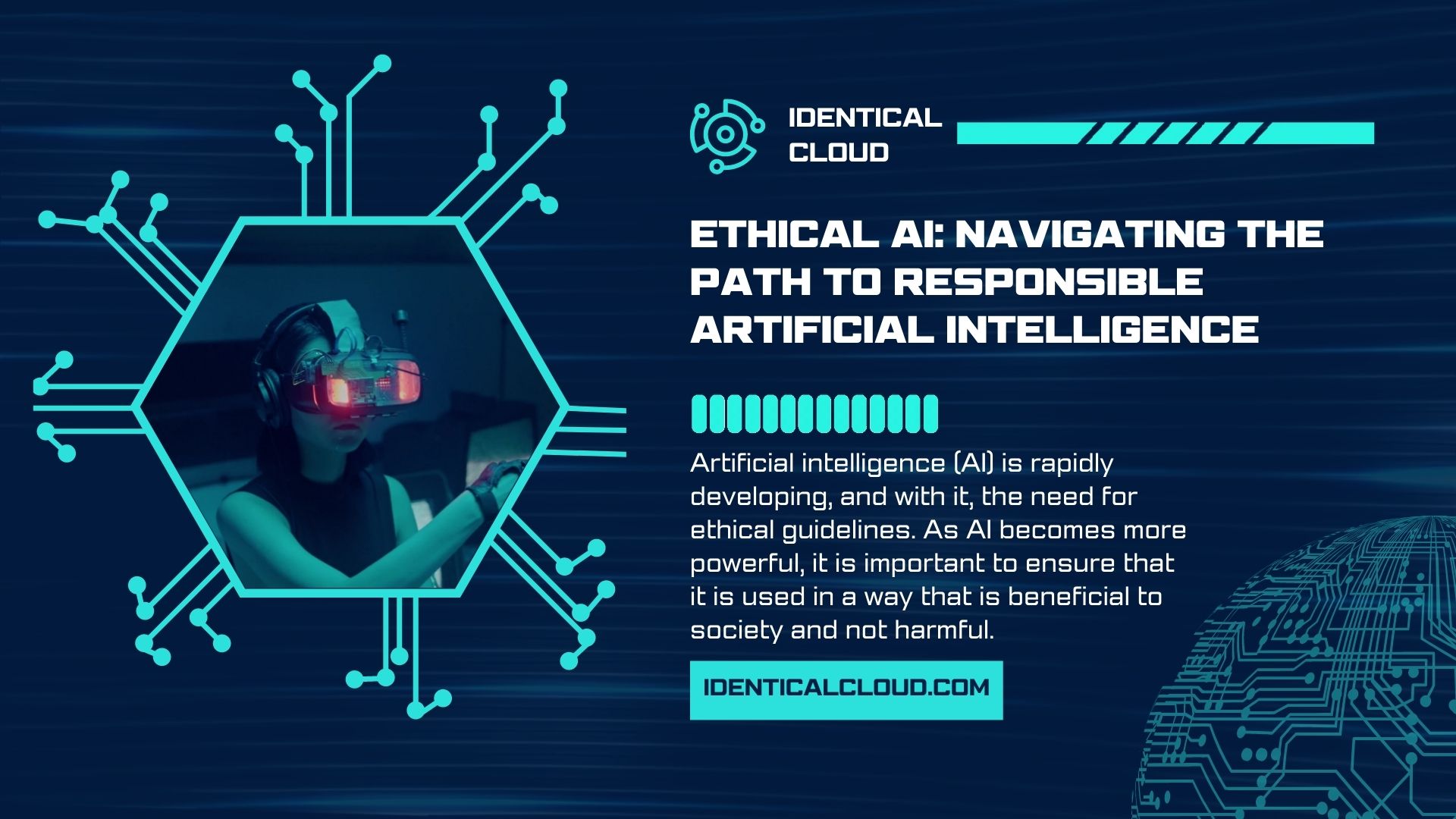
Ethical AI: Navigating the Path to Responsible Artificial Intelligence
Ethical AI: Navigating the Path to Responsible Artificial Intelligence
Artificial intelligence (AI) is rapidly developing, and with it, the need for ethical guidelines. As AI becomes more powerful, it is important to ensure that it is used in a way that is beneficial to society and not harmful.
In this comprehensive blog, we delve into the concept of ethical AI, its significance, key principles, challenges, and the steps we can take to ensure the responsible development and deployment of AI systems.
Understanding Ethical AI:
Ethical AI, also known as responsible AI or trustworthy AI, refers to the development and deployment of artificial intelligence technologies that adhere to ethical principles, respect human values, and prioritize the well-being of individuals and society at large. It encompasses not only the technical aspects of AI but also the social, cultural, and legal considerations that arise from its use.
There are a number of ethical considerations that need to be taken into account when developing and using AI.
- Bias: AI systems can be biased if they are trained on data that is biased. This can lead to discrimination against certain groups of people.
- Privacy: AI systems can collect and store a lot of data about people. This data needs to be protected from unauthorized access.
- Transparency: People need to be able to understand how AI systems work and how they are making decisions. This will help to build trust in AI systems.
- Accountability: If an AI system makes a mistake, there needs to be someone who is accountable for the mistake. This could be the developer of the system, the company that deployed the system, or the government.
The Significance of Ethical AI:
As AI systems become more autonomous and influential, their impact on individuals, communities, and society becomes increasingly profound. Ethical AI is essential for several reasons:
- Human-Centric Approach: Ethical AI places human interests, values, and rights at the forefront, ensuring that AI technologies serve humanity’s best interests.
- Accountability and Transparency: Ethical AI promotes transparency, accountability, and traceability in AI systems’ decision-making processes, reducing biases and preventing unfair outcomes.
- Fairness and Inclusion: Ethical AI strives to eliminate biases and discrimination, ensuring that AI systems treat all individuals fairly, regardless of gender, race, or other attributes.
- Privacy and Security: Ethical AI safeguards individuals’ privacy and data security, preventing unauthorized access and protecting sensitive information.
Principles of Ethical AI:
Several guiding principles underpin ethical AI development:
- Transparency: Developers and users should have a clear understanding of how AI systems make decisions and operate.
- Fairness: AI systems should be designed and trained to avoid bias and ensure equitable treatment of all individuals.
- Accountability: Stakeholders should be accountable for AI system outcomes, and mechanisms for redress should be established for adverse impacts.
- Privacy: AI systems should respect individuals’ privacy and handle personal data responsibly.
- Beneficence: AI should be developed and used to enhance well-being, without causing harm or detriment to individuals or society.
- Robustness: AI systems should be robust and resilient, capable of withstanding adversarial attacks and unexpected scenarios.
Challenges in Ethical AI:
Developing and implementing ethical AI is not without challenges:
- Bias and Fairness: Addressing biases in AI algorithms and ensuring fairness in decision-making is a complex task.
- Accountability: Determining who is responsible for AI decisions and actions can be challenging, especially in highly autonomous systems.
- Regulation and Governance: Striking the right balance between regulating AI development and fostering innovation requires careful consideration.
- Explainability: Ensuring that AI decisions are explainable and understandable is crucial for building trust and acceptance.
Steps Toward Ethical AI:
Creating a framework for ethical AI involves multiple stakeholders, including developers, policymakers, researchers, and users. Some steps to achieve ethical AI include:
- Education and Awareness: Increasing awareness about ethical AI principles and challenges among AI practitioners and the public.
- Collaboration: Encouraging collaboration among interdisciplinary teams to ensure a holistic approach to ethical AI.
- Ethical Guidelines: Establishing clear and comprehensive ethical guidelines for AI development, deployment, and use.
- Auditing and Evaluation: Regularly auditing and evaluating AI systems for fairness, bias, transparency, and other ethical considerations.
- Public Engagement: Involving the public in discussions about the ethical use of AI and seeking their input in decision-making.
Ethical AI is not an option; it is a necessity. As AI technologies continue to shape our world, it is our collective responsibility to ensure that they align with our values, respect human dignity, and contribute to the betterment of society. By embracing the principles of ethical AI, fostering collaboration, and committing to ongoing education and awareness, we can pave the way for a future where AI technologies enhance our lives while upholding our ethical standards.
The journey to ethical AI is an ongoing one, and as we navigate this path, we must strive to strike a balance between innovation and responsibility, always mindful of the profound impact AI has on individuals and society as a whole.
